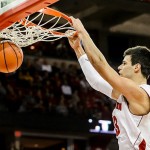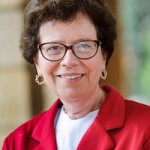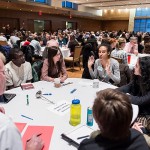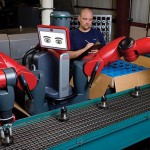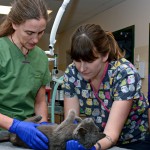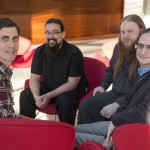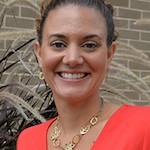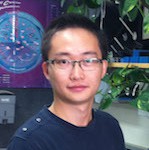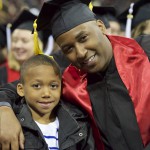Doing it for the team: Business study tests motivational techniques
Noah Lim, an associate marketing professor at the University of Wisconsin–Madison’s Wisconsin School of Business, is shedding light on sales incentives that could help managers devise incentive programs with better returns on investment.
Recent sightings: UW men’s basketball
The No. 6 Wisconsin men’s basketball team (17-2, 5-1 Big Ten) hosted the No. 25 Iowa Hawkeyes at the Kohl Center Tuesday, Jan. 20. Four…
UW computer scientists enhance robotic manufacturing
Some industrial robots are hulking, highly specialized pieces of machinery that are cordoned off by cages from human factory workers.
UW experts forecasting 2015 Wisconsin agriculture trends
In 2014, the total net farm income in Wisconsin reached an all-time high of more than $4 billion, but agricultural experts at the University of Wisconsin–Madison are predicting some changes in 2015. Bruce Jones, a professor of agricultural and applied economics at the University of Wisconsin–Madison, will be among a handful of UW–Madison and UW-Extension experts to recap the status of Wisconsin’s agricultural enterprise in 2014 and discuss trends developing for 2015 at the Wisconsin Agricultural Economic Outlook Forum on Wednesday, Jan. 21.
Recent sightings: UW women’s hockey
The No. 4 Wisconsin women’s hockey team (18-4-2) hosted the Bemidji State Beavers for a pair of games this past Friday and Saturday at LaBahn Arena. The Badgers split the series, losing 2-1 Friday but winning a thriller by the same score in overtime the following day. Wisconsin senior Brittany Ammerman scored the game-winning goal 46 seconds into extra time.
$1.3M in grants, gifts fund creation of animal shelter medicine program
Each year, shelters across the country take in anywhere from 4 million to 8 million animals, and each year, 2 million to 5 million of those animals die, according to the most recent estimates from the Humane Society of the United States. Many of these deaths occur despite the efforts of well-meaning animal lovers, often due to lack of information — a problem Newbury is working to address in her role as director of the new SVM Shelter Medicine Program, which was created after the school raised more than $1.3 million in grants, outright gifts and pledges to help fund it into the future.
Finalists to lead UW Press will visit campus
A nationwide search by the office of the vice chancellor for research and graduate education has identified two finalists for director of University of Wisconsin Press.
Employees have opportunities to learn about HR Design
Several opportunities to learn more about HR Design, the campus’s new human resources system, are coming in the next two months.
New research project funded by Department of Defense will enable faster, better coding
Pliny, a new research project for writing more error-free, secure code, is being funded by a four-year, $11 million grant recently announced by the Defense Advanced Research Projects Agency (DARPA), part of the U.S. Department of Defense. UW–Madison computer scientists will collaborate with their counterparts at Rice University in Houston (which will lead the project), the University of Texas at Austin, and the company GrammaTech.
Humanity has exceeded 4 of 9 ‘planetary boundaries,’ according to researchers
An international team of researchers says climate change, the loss of biosphere integrity, land-system change, and altered biogeochemical cycles like phosphorus and nitrogen runoff have all passed beyond levels that put humanity in a “safe operating space.” Civilization has crossed four of nine so-called planetary boundaries as the result of human activity, according to a report published today in Science by the 18-member research team. Among them is Steve Carpenter, director of the University of Wisconsin–Madison Center for Limnology and the only U.S.-based researcher on the study.
UW-Madison scientists find how many cancers may evade treatment
Xiaojun Tan, a graduate student in Richard A. Anderson’s lab at the University of Wisconsin–Madison, made an unexpected observation while studying the locations inside cells where the epidermal growth factor receptor, EGFR, can be found. His subsequent investigation revealed how cancer was evading treatment drugs: by sneaking through the cellular back door.
Chemical dial controls attraction between water-repelling molecules
Abbott, Gellman and a group of University of Wisconsin–Madison researchers have provided new insights on hydrophobic interactions within complex systems. In a study published today in the journal Nature, the researchers show how the nearby presence of polar (water-attracted, or hydrophilic) substances can change the way the nonpolar hydrophobic groups want to stick to each other.
Carbon nanotube finding could lead to flexible electronics with longer battery life
University of Wisconsin–Madison materials engineers have made a significant leap toward creating higher-performance electronics with improved battery life — and the ability to flex and stretch. Led by materials science Associate Professor Michael Arnold and Professor Padma Gopalan, the team has reported the highest-performing carbon nanotube transistors ever demonstrated. In addition to paving the way for improved consumer electronics, this technology could also have specific uses in industrial and military applications.
King Holiday keynote speaker depicted in film ‘Selma’ will bring timely message
King Holiday keynote speaker depicted in film "Selma" will bring timely message
After the game ends, UW–Madison helps athletes return to the classroom
The last time LaMar "Soup" Campbell sat in a University of Wisconsin–Madison classroom, Bill Clinton was president. Melvin Gordon had just turned 5 years old.


